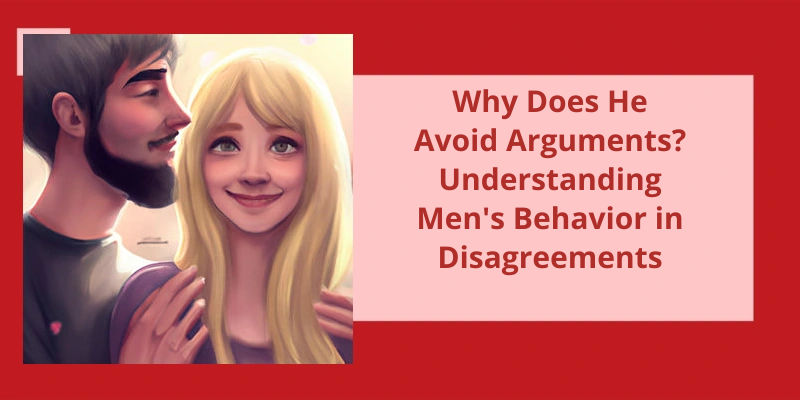Relationships are often unpredictable and can leave us feeling confused about what to do when things don't seem quite right. If your boyfriend has been making you feel unimportant, it can be tempting to push your feelings aside and keep going on with the relationship as normal. However, ignoring your emotions can cause more harm than good in the long run. It's important to communicate with your partner and let them know how you're feeling. By expressing your concerns, you’re giving your partner the chance to address the issue and make things right. This may not be an easy conversation, but it's necessary to ensure that you both are on the same page in the relationship. If your partner dismisses your feelings or tries to give excuses, it may be time to evaluate the partnership and decide if it’s worth your investment of time and emotions. Ultimately, prioritizing your own well-being is imperative in any relationship.
How Do You Tell Your Boyfriend You Feel Unimportant?
It’s always better to communicate openly and honestly with your partner rather than hiding your true feelings. If you’re feeling unimportant in your relationship, it’s essential to express this to your boyfriend in a constructive manner. Address your concerns without attacking or blaming your partner. Find a time when both of you’re calm and relaxed, and you’ve their undivided attention.
Try to use “I” statements instead of “you” statements. For instance, say something like “I feel unimportant when you cancel our plans at the last minute” instead of “You always cancel our plans, and you don’t care about me.”. This will help prevent your partner from feeling defensive and improve the chances that they’ll listen to you.
It’s also crucial to be specific about what makes you feel unimportant. Is it because your partner is constantly on their phone when you’re spending time together? Or because they rarely initiate plans? Be clear about your needs and desires so that your partner can understand what changes they need to make.
When sharing your feelings, avoid accusing or blaming your partner. Instead, focus on your emotions and how their behavior makes you feel. This will prevent them from becoming defensive, and they’ll be more likely to listen to your concerns.
Keep in mind that communication is a two-way street. Listen to your partners perspective and try to understand where they’re coming from. Maybe they aren’t aware that their behavior is making you feel unimportant. Encourage your partner to communicate their feelings as well. This will help you both to work together towards a solution.
Communication is the key to any healthy relationship. Remember to listen to your partners perspective and work together towards a solution. If your partner isn’t receptive to your concerns, it may be time to reassess the relationship and consider if it’s meeting your needs.
Signs of a One-Sided Relationship and How to Address Them
- Feeling like you’re giving more than receiving
- Constantly making excuses for your partner’s behavior
- Feeling like your thoughts and feelings aren’t being validated or heard
- Feeling guilty for setting boundaries or expressing your needs
- Feeling like you’re walking on eggshells or afraid to speak up
- One-sided emotional or physical intimacy
- Feeling controlled or manipulated
- Difficulty or reluctance to spend time with friends or family
- Feeling drained and exhausted from constantly trying to please your partner
- Communicate openly and honestly with your partner about your feelings
- Set clear boundaries and stick to them
- Take time for yourself and prioritize self-care
- Consider seeking support from a therapist or trusted friend/family member
- Recognize that a healthy relationship involves mutual respect and compromise
In any relationship, it’s important to feel loved and valued. Unfortunately, sometimes our partners may unintentionally make us feel inadequate. This can be a difficult situation to navigate, but it’s important to address it in order to improve the relationship and avoid feeling helpless. One approach is to identify specific instances where your partner’s words or actions made you feel inadequate, and then have an honest conversation about your feelings with your partner. Let’s explore this approach further.
What to Do When Your Partner Makes You Feel Inadequate?
Feeling inadequate in a relationship is one of the most debilitating and painful emotions one can experience. When your partner makes you feel inadequate, it can cripple your self-esteem and send you spiralling into a world of self-doubt and insecurity. It’s vital to address these feelings head-on rather than ignoring them, which will only worsen the situation.
One of the first things you should do is write down specific examples of things your partner has said or done that have made you feel inadequate. This way, you can clearly articulate what’s happening and pinpoint the areas that need to be addressed. It’s important to be concise and clear in your examples to avoid raising unnecessary defensiveness in your partner.
When having this conversation, it’s essential to listen carefully to what your partner has to say. Try to understand their perspective and why they may be comparing you unfavourably. They may not even be aware of the impact their words or actions are having on you and your relationship. By listening carefully, you can work together to find a way forward that works for both of you.
It’s also crucial to ask your partner how they see your future together. This conversation will help you understand their expectations and goals for the relationship. It will also allow you to express your own hopes and dreams. By being open with each other, you can create a shared vision for your future that will strengthen your relationship.
Finally, remember that communication is the key to a healthy and successful relationship. Be open and honest about your feelings, and listen actively to your partner. By doing so, you can create a collaborative and compassionate space where both of you can thrive.
Source: My partner is making me feel inadequate – The Guardian
It’s frustrating and hurtful when you feel unimportant in your relationship. But before you make any decisions, it’s important to reflect on your feelings and have an honest conversation with your partner. You can also try to add some spice to your relationship or seek help from a therapist or relationship coach. Here are some tips to help you navigate this difficult situation.
What to Do When Your Partner Makes You Feel Unimportant?
One of the most difficult feelings to experience in a relationship is feeling unimportant or unwanted. It can leave you feeling alone, hurt, and confused. However, there are steps you can take to address this issue and hopefully improve your relationship. The first step is to reflect on the feeling by yourself. Take some time to think about why youre feeling this way and what might be contributing to it. It’s important to identify the root cause of your feelings so you can communicate them effectively to your partner.
Once youve reflected on your feelings, the next step is to have a conversation with your partner. This can be a tough conversation to have, but it’s important to be honest and open about how youre feeling. Share specific examples of situations or actions that have made you feel unimportant or unwanted. It’s important to avoid blaming or accusing your partner and instead focus on how their behavior or actions have affected you.
If youve had conversations with your partner and are still feeling unimportant or unwanted, it might be time to switch things up romantically or sexually. This could mean planning a special date night, trying a new hobby together, or exploring your sexual desires and preferences. The key is to find ways to reconnect with each other and reignite the spark that brought you together in the first place.
Another option to explore is speaking to a therapist or relationship coach. Theres no shame in seeking outside help to work through relationship issues. A therapist or coach can provide you with tools and strategies to communicate effectively with your partner, manage your emotions, and strengthen your relationship. They can also help you explore any underlying issues that might be contributing to your feelings of unworthiness.
Reflect on your feelings, have an open and honest conversation with your partner, switch things up romantically or sexually, and seek outside help if needed. Remember, relationships take work and effort, but with dedication and commitment, they can thrive and grow.
Signs to Look Out for That Indicate You May Be Feeling Unimportant in Your Relationship
- You constantly feel ignored or dismissed by your partner.
- Your partner doesn’t include you in important decisions or events.
- Your partner doesn’t ask for or value your opinions.
- Your partner doesn’t prioritize spending time with you.
- You feel like you’re always apologizing or walking on eggshells around your partner.
- Your needs and wants are consistently ignored or dismissed.
- Your partner belittles you or makes you feel inferior.
- Your partner is more focused on their own needs and desires than yours.
- Your partner gives more attention or affection to others than to you.
- You feel like you’re constantly trying to prove your worth to your partner.
It can be difficult when you don’t feel important in a relationship. However, there are ways to deal with not feeling loved and valued by your partner. Taking care of yourself, forming new relationship traditions, communicating your needs to your partner, taking a break if necessary, and seeking counseling are all ways to address the issue and find a path forward towards a healthier, happier relationship.
What to Do When You Don’t Feel Important in a Relationship?
Feeling unimportant in a relationship can be a challenging experience, particularly when you feel like your contribution to the relationship isn’t being recognized or appreciated. It can feel debilitating and make you question the value of your relationship. However, it’s essential to recognize that your worth isn’t determined by how others perceive you. You must take ownership of your happiness and self-worth.
One crucial factor that can help you deal with feelings of inadequacy in a relationship is ensuring that you’re happy with yourself. This entails building a sense of independence and engaging in activities that make you feel fulfilled. When you feel satisfied with life outside of your relationship, you’ll be less dependent on your partner for your happiness.
Another way to deal with feelings of unimportance in a relationship is by forming new relationship traditions. This could be as simple as establishing date nights, or it could be more complex, such as planning a romantic getaway together. This approach can help you create a sense of shared experiences and memories, which can strengthen your connection with your partner.
One of the most challenging aspects of feeling unimportant in a relationship is that it can be challenging to express yourself honestly and openly to your partner. However, it’s vital to convey how you feel openly and honestly. Telling your partner, “I don’t feel loved” can be a challenging conversation to have, but it’s a vital step in addressing the issue.
In some cases, taking a break from the relationship may be necessary. This may involve going on a trip alone or setting boundaries around how much time you spend with your partner. This approach can help you reset your focus and priorities and rediscover what’s essential to you.
Finally, if you don’t feel loved in a relationship, seeking the help of a counselor can be a transformative experience. A trained professional can provide you with the support and guidance you need to work through your emotions and develop strategies for improving your relationship. They can also help you develop a better understanding of your self-worth and how to communicate your feelings effectively.
How to Set Boundaries in a Relationship to Avoid Feeling Unimportant
- Communicate your needs and boundaries clearly
- Identify what behaviors are unacceptable and communicate that to your partner
- Be consistent in enforcing your boundaries
- Don’t make excuses for your partner’s behavior if it violates your boundaries
- Take time for yourself and prioritize self-care
- Be willing to walk away if your boundaries are repeatedly violated
It’s important to recognize that feeling unloved in a relationship is an experience that many people go through. As relationships evolve and change, it’s natural for some level of discontent to arise. However, it’s also crucial to address these feelings and communicate with your partner about what you’re going through. In this article, we’ll explore the common causes of feeling unloved in a relationship, how to address these feelings, and when it may be time to consider moving on.
Is It Normal to Feel Unloved in a Relationship?
Sometimes, it may not even be related to the relationship itself. Personal issues such as depression, anxiety, or low self-esteem can also cause someone to feel unloved in a relationship. In fact, it’s important to realize that feeling unloved doesn’t necessarily mean that the relationship is failing or that the other partner is doing something wrong. It may simply be a reflection of the individuals own insecurities or emotional turmoil.
It’s important for both partners to communicate openly and honestly about their feelings, including any feelings of being unloved or unwanted. This can be difficult, especially if one partner is afraid of hurting the others feelings or starting an argument. However, avoiding the issue only makes it worse and can lead to resentment and further distance between the partners. Instead, it’s better to approach the conversation with empathy and understanding, and to focus on finding solutions together.
Sometimes, the answer may be as simple as spending more quality time together or prioritizing physical intimacy. Other times, it may require deeper emotional work, such as therapy or counseling. The important thing is to not give up on the relationship without trying to address the underlying issues first.
It’s also worth noting that feeling unloved in a relationship doesn’t necessarily mean that the love is gone. Love is a complex emotion that can take many forms. Sometimes, it may be expressed in different ways than what one partner expects or desires. For example, one partner may show their love through acts of service or gifts, while the other partner may prefer physical touch or words of affirmation. Understanding these differences and being open to receiving love in different ways can help improve the relationship and reduce feelings of being unloved.
However, it’s important to not let these feelings fester and to actively work towards finding solutions together. With open communication, empathy, and a willingness to put in the effort, it’s possible to overcome any feelings of being unloved and create a deeper, more fulfilling relationship.
Signs of Being Unloved in a Relationship
- Feeling constantly ignored or dismissed by your partner.
- Lack of physical affection or intimacy.
- Your partner rarely expresses love or appreciation towards you.
- Feeling like you’re always the one putting in effort while your partner doesn’t reciprocate.
- Your partner doesn’t make you a priority and puts other things or people before you.
- You’re consistently disrespected or mistreated by your partner.
- Your partner doesn’t show an interest in your life or your well-being.
- You feel emotionally distant from your partner and there’s a lack of connection.
- Your partner doesn’t support you and your goals.
- You feel unhappy and unfulfilled in the relationship.
Conclusion
In any relationship, feeling valued and appreciated is crucial to maintaining a healthy and happy dynamic. If your boyfriend consistently makes you feel unimportant, it's important to communicate your feelings and concerns with them. By expressing your emotions and sharing your experiences, you can gain a better understanding of where your partner is coming from and why they might be behaving the way they are. However, if your partner is dismissive or unresponsive to your concerns, it may be time to assess the relationship and consider whether it’s truly fulfilling your needs and desires. Remember, a relationship should be a partnership where both parties feel valued and respected.






